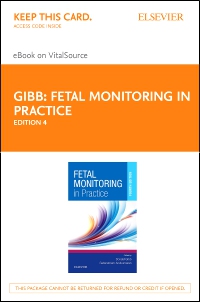
Fetal Monitoring in Practice - Elsevier eBook on VitalSource (Retail access Card), 4th Edition
Elsevier eBook on VitalSource - Access Card

-
- Clear and friendly writing style makes a potentially challenging subject straightforward and accessible
- Explains the correct use of terminology to help ensure safe and accurate communication
- Emphasizes the importance of using monitoring techniques within the context of detailed clinical assessment
- Explains the basics of interpretation including the influence of drugs used for pain relief
- Explains common pitfalls associated with equipment usage and provides practical advice on how to avoid them
- Explains the underlying pathophysiology associated with abnormal changes seen on the CTG
- Explains and contextualizes relevant clinical trial data
- Clinical scenarios demonstrate common presentations such as breech birth, twin pregnancies, brow presentation, hypertension, and eclampsia
- Real CTG traces demonstrate more complex presentations such as prolonged deceleration, placental abruption, and fetal bleeding
- Perfect for candidates undertaking the Advanced Training Skills Module of the RCOGs 'Advanced Labour Ward Practice'
-
1. Introduction
2. Clinical assessment and recording
3. Auscultation of the fetal heart rate
4. Electronic fetal monitoring – terminology and interpretation
5. Pathophysiology of fetal heart rate (FHR)
6. NICE and FIGO guidelines for interpretation of FHR patterns
7. Antepartum fetal surveillance
8. The admission test by cardiotocography or by auscultation
9. Assessment of uterine contractions
10. Oxytocin and fetal heart rate changes
11. Meconium, infection, anaemia, bleeding
12. Cardiotocographic interpretation: additional clinical scenarios
13. Cardiotocographic interpretation: more difficult problems
14. Fetal scalp blood sampling pH and lactate
15. Fetal ECG waveform analysis
16. Medico legal issues with CTG and current strategies to reduce litigation
17. Competency testing in CTG interpretation prior to practice


 as described in our
as described in our 